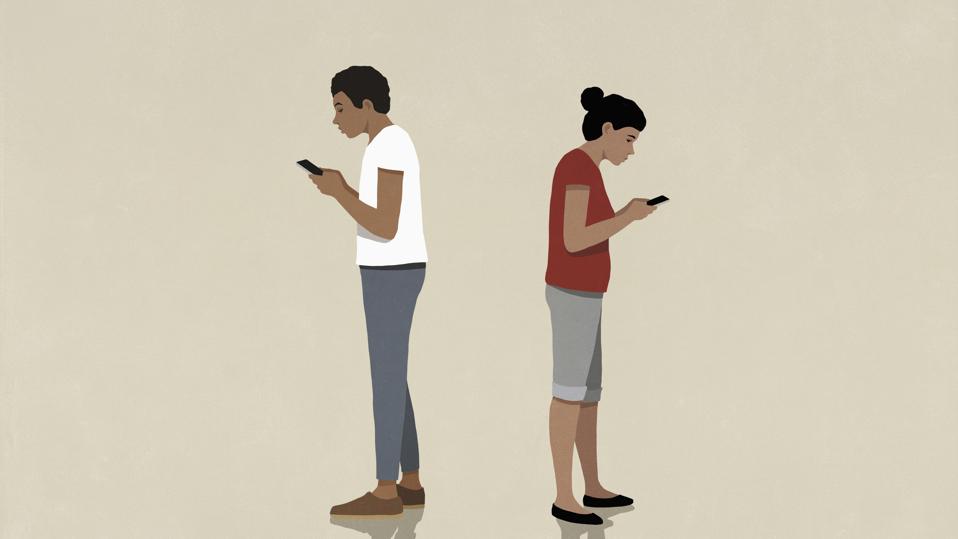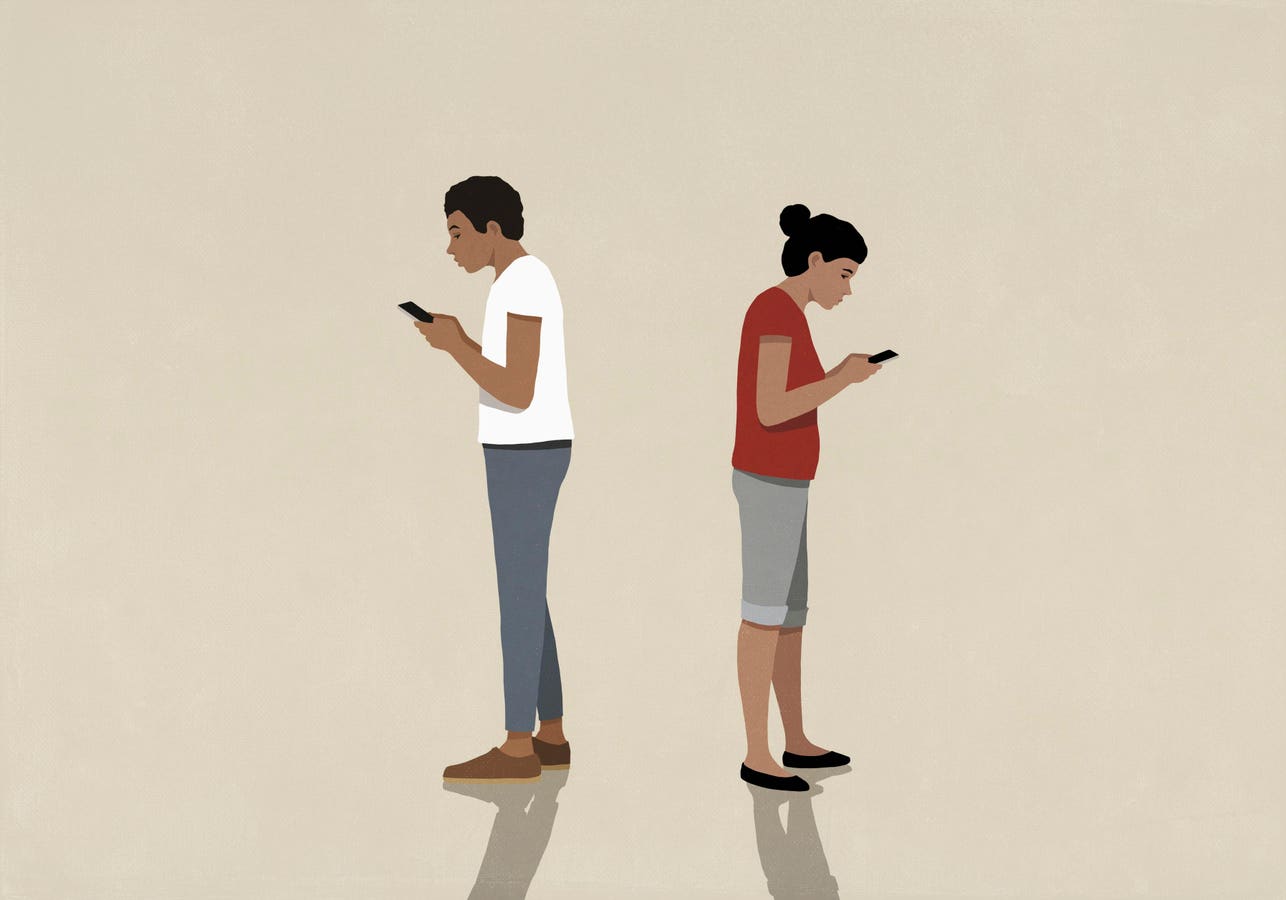
New research reveals the profound ways that “phubbing” can leave couples feeling starved for attention. Here’s how it could be hurting your relationship.
getty
Even a partner with the purest of intentions can hurt your feelings without meaning to. Forgotten anniversaries and broken promises are usually accidents, but that doesn’t mean they don’t sting. Yet, most of these pains are the product of once-off mistakes that we learn from and grow past.
But according to August 2025 research published in the Journal of Social and Personal Relationships, there’s one mistake that modern lovers seemingly tend to make again and again. But unlike a one-time argument, this mistake is one that can have a compounding, crushing impact: “phubbing.”
Here’s how phubbing can change a relationship for the worse, according to the new study’s findings.
What Is ‘Phubbing’?
The term “phubbing” came into existence over a decade ago, in 2012. By combining the words “phone” and “snubbing” into a portmanteau, researchers now had a neologism to describe the increasingly prevalent phenomenon that previously couldn’t be named: snubbing the person in front of you in favor of the screen in your hand.
Chances are, you’ve likely been guilty of phubbing before. In a relationship, where partners are around one another often throughout the day, it can take on a variety of different forms. Usually, however, it’s quite subtle. Like a quick peek at the notification that just came through mid-sentence, or a “quick reply” to someone that results in several minutes of awkward silence, as your partner waits patiently for you to finish.
It’s the kind of habit that can seem almost trivial when you’re guilty of it yourself. After all, you’re probably not ignoring your partner on purpose; if anything, you’re just multitasking. But for your partner, who sits on the receiving end, those seconds of your split attention can cut much deeper than you’d like to imagine. For them, it likely feels as though they’re fighting for your attention — and, even worse, that they’re losing to an inanimate object, no less.
Of course, a single instance might not mean much, especially if you apologize or explain your reasoning. But should it become a habit, your phubbing might leave your partner feeling consistently as though they’re less important than whatever’s on your phone screen today. And according to the August 2025 study, this seemingly small behavior can have a surprisingly deep impact for partners as individuals, and for the relationship as a whole.
How Phubbing Harms Relationships
The researchers behind the study were highly interested in how something as ordinary as a phone can cause lasting damage to couples’ intimacy, as previous research has long suggested. As such, they surveyed 51 couples who were quarantining together during the COVID-19 lockdown period, measuring three key factors in particular:
How often the participants felt their partner had phubbed themHow deprived of affection they’d been feeling of lateHow satisfied they were with their relationship at that point in time
Phubbing, in particular, was measured through questions that looked at whether their partner often glanced at their phone during conversation or checked their phone during pauses. Affection deprivation, on the other hand, was measured by asking participants whether they felt if they were getting enough hugs, smiles or kind words from their partner.
The results were surprisingly cut and dry. The more a participant had been reportedly phubbed by their partner, the more deprived of affection they felt. This deprivation was, in turn, associated with lower levels of relationship satisfaction, too.
Simplified, these findings suggest that phubbing isn’t something that necessarily harms your relationship directly in an obvious sense. Rather, its effects are indirect — in that they can leave you feeling emotionally neglected if it becomes a regular habit.
The most striking finding, however, was that the effects of affection deprivation weren’t limited to the phubbed partner’s satisfaction alone. It was indirectly tied to the phubber’s satisfaction, too. In other words, one partner’s emotional neglect was profound enough to ripple across the relationship as a whole.
Likely, this link becomes self-sustaining. Should one partner feel as though they’re constantly being phubbed, they might start withdrawing to a similar extent; they no longer initiate affection, and they start making their irritation known in small, defensive ways. Their partner will likely notice this shift and, in response, become just as frustrated or distant.
What might’ve begun as just a couple of distracted glances can, over time, give rise to a petty, resentful back-and-forth of withdrawal.
The tragedy, however, is that it’s unlikely to have started intentionally. No one goes out of their way to make their partner feel invisible. But, as the study’s findings suggest, even unintentional neglect can have serious emotional consequences if it becomes the norm.
The Importance Of Intentional Presence
It’s important to note that the takeaway here shouldn’t be to start viewing your phone as the enemy. Phones are very useful tools, and in many ways, they’re facilitators of connection, rather than barriers to it. That said, this research makes it very clear that attention is an invaluable currency in a relationship. The second we start to divide it, we risk making our partner feel small or insignificant.
Of course, it’s an unrealistic expectation to remove your phone from the equation entirely. In this sense, being fully engaged with your partner, even during the moments where you think it won’t matter, is essential in protecting your relationship from technoference.
Being mindful of how we use our phones around our partners matters so much more than we might think it does in the moment. Short interactions that you might even consider inconsequential can have the power to either reinforce or threaten intimacy: talking about your day while cooking, laughing over a TV show, sitting together on the couch. It all depends on how attentive we are.
This makes it a priority for you to put your phone face down during meals, or even leave it in another room during conversations altogether. This makes it essential to set aside “tech-free” times at home, as well as “tech-free” zones.
Phones may be deeply entrenched into our routines, but that doesn’t mean they need to be in our hands at all times. There’s a time and a place for catching up on messages or scrolling through TikTok. But when you’re spending quality time with your partner, that time and place is not here and now.
What this new research reminds us is that we need to rethink what affection looks like. Indeed, it can take the form of hugs and kisses — but it can also look like maintaining eye contact, nodding, smiling and, most crucially, listening.
So, take a second to think the next time you’re tempted to check your phone mid-conversation. As unsubstantial as that moment may feel to you, it could very well be an opportunity for connection that you’ll never be able to get back.
Has phubbing become an inadvertent habit in your relationship? Take this science-backed test to find out how much harm it might be causing you: Phubbing Scale

